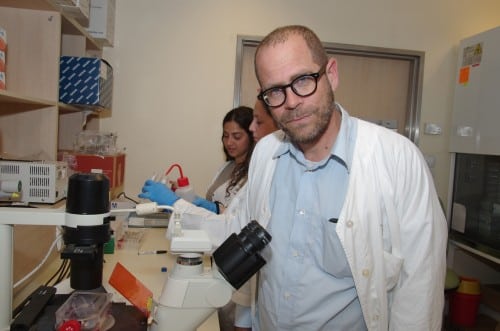Prof. Dekel is one of the world's leaders in the field of tissue stem cell research with an emphasis on kidneys and kidney cancer. The research group he heads at Sheba Hospital uses a variety of innovative methods to study the relationship between development, regeneration and cancer development at the stem cell level and at the same time develops pre-clinical models in laboratory animals in order to translate the findings into clinical applications.

Prof. Binyamin Dekel, Director of the Pediatric Stem Cell Research Institute and Director of the Pediatric Nephrology Unit at the Edmond and Lili Safra Children's Hospital at the Sheba Medical Center, won the prestigious award of the Vimeh family for excellence in cancer research for the year 2015. The award was presented to Prof. Dekel last week as part of the scientific gathering to celebrate the award at Beit Rambam patients.
Professor Dekel has medical and scientific training. After completing his medical studies with honors at the Rappaport Faculty of Medicine at the Technion, he specialized in pediatrics and pediatric nephrology at Sheba Medical Center and Schneider Children's Hospital, and also completed a PhD with honors and a post-doctorate at the Weizmann Institute of Science. Professor Dekel serves as an associate professor in the Department of Pediatrics and an adjunct faculty member in the Department of Molecular Genetics at the Sklar School of Medicine, Tel Aviv University. He served as a visiting professor at the Institute of Stem Cells and Regenerative Medicine at Stanford University and serves as a member of the American Society of Clinical Investigation.
Prof. Dekel is one of the world's leaders in the field of tissue stem cell research with an emphasis on kidneys and kidney cancer. The research group he heads at Sheba Hospital uses a variety of innovative methods to study the relationship between development, regeneration and cancer development at the stem cell level and at the same time develops pre-clinical models in laboratory animals in order to translate the findings into clinical applications.
Prof. Dekel and his team were the first to identify and isolate the tissue stem cells from human embryonic kidneys. These "good" stem cells are able to grow normal kidney tissue. Moreover, when the research group scanned kidney tumors in children (Williams tumor), they identified within the tumors stem cells that were remarkably similar to those found in fetal kidneys. With the help of advanced cell sorting technologies, Prof. Dekel and his team were able to isolate the cancer stem cells and show that despite the almost complete identity with the "good" stem cells, they do not form an organ but form the tumor on all its components. That is, while the good stem cells regenerate all the time and are responsible for the growth of the organ in embryonic life, the cancerous stem cells also have the ability to self-renew and are responsible for the growth of the cancerous tumor in all its components and its proliferation.
Prof. Dekel understood the therapeutic potential inherent in this discovery; Attacking those cancer stem cells fueling the tumor will lead to its extinction. Indeed, in-depth characterization of the cancer stem cells led to the discovery of specific markers of those cells. Against one of the discovered markers an antibody was directed to which chemotherapy was attached. This treatment led to the disappearance of human tumors taken from patients and transplanted into mice. In addition, the researchers showed that during the transition between embryonic life and adult life, the tissue stem cells change their properties and capacity so that the same marker they used to attack the cancer stem cells in the tumor does not appear at all in the adult but only in the fetus, and therefore enables cancer treatment in patients without harming the adult cells. This treatment method that Prof. Dekel led in childhood cancer in basic and pre-clinical trials is now in clinical trials in the USA (second phase) and demonstrates how a discovery in the laboratory can quickly reach the patient's bedside. Based on these results, additional innovative treatments for a series of aggressive tumors are tested in his laboratory.
For the groundbreaking discoveries of the mechanisms of development of kidney cancer in children and modern methods for its treatment and the entirety of his work, the award committee decided to award Prof. Dekel with the Knower Award for excellence in cancer research.
